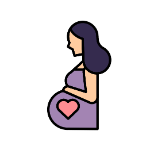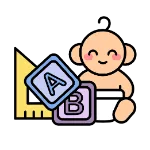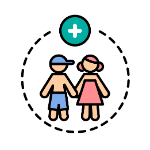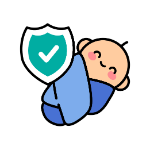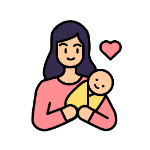
Parenting
What Is Separation Anxiety In Babies And How To Cope With It?
8 min | Updated on 30-03-2023 by HappyPreggie
There will be a time when your baby starts behaving differently than usual. They might become clingier, fearful of people or cry when being left alone, even for a short while. This is known as separation anxiety, and it is a normal part of your baby’s development. Separation is especially difficult for your baby because it is connected with their biggest desire, that is attachment. The younger your baby is, the more they long for contact and closeness because of dependency needs.
 (Image credits to Yale Baby School)
(Image credits to Yale Baby School)
Read on to find out what causes separation anxiety, when it usually starts, and what measures you can take to help reassure your baby or toddler as they go through this developmental stage of their life.
Separation anxiety is the anxiety your baby feels when you (parent), or someone close to them, like their nanny, leaves them for work or drops them off at the daycare. Signs of separation anxiety in babies can appear as early as when they are 4 to 5 months old and could last until they are 2 years old.
While this can cause distress for the babies and parents, separation anxiety also brings good meaning to your relationships. It means that your baby has formed a deep and close bond with you and that they feel safe with you around. As they continue to grow and are introduced to many new and unknown things in the world, which can be scary for them, your presence is the only thing making them feel safe and secure.
Your baby may first develop separation anxiety after they learn of object permanence; the understanding that people and things will continue to exist even if they are out of sight. However, babies are unfamiliar with the concept of time, so they are not sure when you will be back. This situation makes them restless and fearful, making them crave your presence all the time.
Separation anxiety also happens after they are introduced more to the world. The changes and unfamiliarities cause them to feel upset and unsafe, so they require more of your protection.
If your baby is showing signs as listed below, it is safe to assume that they are experiencing separation anxiety.
There are several ways you can do to help your baby cope with separation anxiety, and we have listed some of the easiest and most efficient below:

Games like peekaboo or hide-and-seek can teach your children that people go away, but they will return. Similarly, you can also play a game of 'hiding and unhiding toys' to help them understand that even if the object is out of sight, it still exists and will appear again.
While you may be tempted to escape when your baby is not noticing, it can cause a long-term problem for your baby. They might never know when you will disappear, making them more confused and jittery, thus causing their anxiety to become worse.
Babies pick up on smells quickly and are often comforted by familiar scents, like their mom’s or someone close to them’s. Giving them something that has your scent; a teddy bear, plushie or scarfs, allows them to feel as if you are close and nearby.
Of course, practice makes perfect. You can let your baby crawl or leave them in another room, and once you’re sure it is safe, inform your baby where you’ll be and when you’ll be back. If they start crying, don’t run over immediately. Instead, call out from where you are to comfort them. This can help them understand that nothing bad will happen when you’re gone and that you’ll still come back.

Long goodbyes can cause more distress and sadness for your baby. To keep it simple, you can create a goodbye ritual, such as special gestures or giving your baby toys to comfort them. It is okay to comfort them when they cry, but do not stay for long. Tell them where you’re going and when you’ll be back, and then leave, so that your baby will not feel more attached to you at the moment.
Separation anxiety is a common phase in their growth development. Most babies went through this phase, and there’s nothing wrong with it. However, if you think that your child's separation anxiety is getting worse by the day and is a big concern, consider reaching out to a professional for consultations.
Once your baby is over their separation anxiety, they may be more active and will explore the house independently. Therefore, it is important to prepare your house so that it is safe for your baby. Read through our articles on Checklist to Babyproof Your House and Safety Devices You Definitely Need At Home to protect your baby better!
Read on to find out what causes separation anxiety, when it usually starts, and what measures you can take to help reassure your baby or toddler as they go through this developmental stage of their life.
What is Separation Anxiety in Babies?
Separation anxiety is the anxiety your baby feels when you (parent), or someone close to them, like their nanny, leaves them for work or drops them off at the daycare. Signs of separation anxiety in babies can appear as early as when they are 4 to 5 months old and could last until they are 2 years old.
While this can cause distress for the babies and parents, separation anxiety also brings good meaning to your relationships. It means that your baby has formed a deep and close bond with you and that they feel safe with you around. As they continue to grow and are introduced to many new and unknown things in the world, which can be scary for them, your presence is the only thing making them feel safe and secure.
What are the causes of Separation Anxiety in Babies?
Your baby may first develop separation anxiety after they learn of object permanence; the understanding that people and things will continue to exist even if they are out of sight. However, babies are unfamiliar with the concept of time, so they are not sure when you will be back. This situation makes them restless and fearful, making them crave your presence all the time.
Separation anxiety also happens after they are introduced more to the world. The changes and unfamiliarities cause them to feel upset and unsafe, so they require more of your protection.
Signs of Separation Anxiety in Babies:
If your baby is showing signs as listed below, it is safe to assume that they are experiencing separation anxiety.
- Increased clinginess, especially in new or unfamiliar surroundings
- Crying when left alone, or with someone else, even for a short while
- Midnight wake-ups, and crying in search of you
- Fear of strangers, even with close relatives such as grandparents
- Strong preference for one babysitter over another
- Resisting when being put down on bed or crib
- Only able to sleep when you are around
How To Help Your Baby Copes With Separation Anxiety
There are several ways you can do to help your baby cope with separation anxiety, and we have listed some of the easiest and most efficient below:
i. Play games to encourage separations
(Image credits to NewFolks)
Games like peekaboo or hide-and-seek can teach your children that people go away, but they will return. Similarly, you can also play a game of 'hiding and unhiding toys' to help them understand that even if the object is out of sight, it still exists and will appear again.
ii. Avoid sneaking out on your child
While you may be tempted to escape when your baby is not noticing, it can cause a long-term problem for your baby. They might never know when you will disappear, making them more confused and jittery, thus causing their anxiety to become worse.
iii. Give them something that will remind them of you
Babies pick up on smells quickly and are often comforted by familiar scents, like their mom’s or someone close to them’s. Giving them something that has your scent; a teddy bear, plushie or scarfs, allows them to feel as if you are close and nearby.
iv. Practice short separations at home
Of course, practice makes perfect. You can let your baby crawl or leave them in another room, and once you’re sure it is safe, inform your baby where you’ll be and when you’ll be back. If they start crying, don’t run over immediately. Instead, call out from where you are to comfort them. This can help them understand that nothing bad will happen when you’re gone and that you’ll still come back.
v. Keep goodbyes short and upbeat
(Image credits to Lolo Lullaby)
Long goodbyes can cause more distress and sadness for your baby. To keep it simple, you can create a goodbye ritual, such as special gestures or giving your baby toys to comfort them. It is okay to comfort them when they cry, but do not stay for long. Tell them where you’re going and when you’ll be back, and then leave, so that your baby will not feel more attached to you at the moment.
Separation anxiety is a common phase in their growth development. Most babies went through this phase, and there’s nothing wrong with it. However, if you think that your child's separation anxiety is getting worse by the day and is a big concern, consider reaching out to a professional for consultations.
Once your baby is over their separation anxiety, they may be more active and will explore the house independently. Therefore, it is important to prepare your house so that it is safe for your baby. Read through our articles on Checklist to Babyproof Your House and Safety Devices You Definitely Need At Home to protect your baby better!
Join the largest support network for family health and well-being. Ready to get started?
Get started
